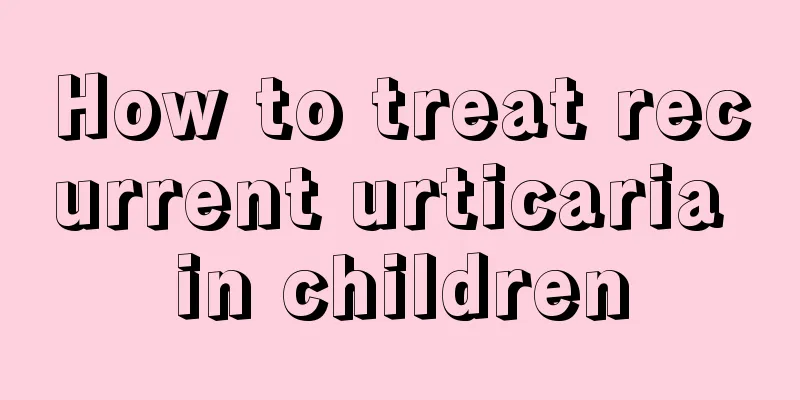What should I do if my three-year-old child cries a lot?

|
Crying is a way for babies to express their discomfort. Everyone knows that children cannot speak, so when they are unwell, they can only express their discomfort by crying. However, for babies who cannot speak, if they cry for no reason, parents must observe carefully. If a three-year-old baby cries for no reason, it is best for parents to take the child to the hospital to find out the cause. If it is a disease, it is best to treat it as soon as possible. 1. How to educate a 3-year-old child who loves to cry? 1.1. Understand your child’s sensitivity Sensitive children feel pain more strongly than other children, and it is not wise to stop them from crying. Parents should help their children gradually become stronger through understanding, sympathy and encouragement. 1.2. Cultivate children's self-esteem Children who lack self-esteem are prone to being sensitive and crying, so improving children's self-confidence and self-esteem will make them good at self-recognition and generate a sense of accomplishment. You should not have too high expectations on your children and ask them to do things beyond their abilities. 1.3. Let children express themselves in words Teach your child to express his or her pain clearly and explain why he or she is crying. At this time, the mother can give some comfort to reduce the chance of crying. 1.4. Appropriate diversion of attention Ask your child irrelevant questions to divert his attention, or you can let him decide between two choices. If he is completely dissatisfied with your suggestion, pick him up and take him away from the scene. 2. How to deal with a 3-year-old child who loves to cry 2.1 Cold treatment When faced with some unprincipled demands from children, parents should insist on not agreeing or ignoring them, let the child cry freely, and after the child calms down, analyze with him why his demands were not met, and ask him not to make such unreasonable demands next time. 2.2. Conditional swap method If the child continues crying, you can agree to his conditions first, but at the same time also ask him to agree to one condition of yours and tell him that there will be a serious consequence if he fails to do so. Of course, what we adults ask must be what the child can do, such as telling his parents what happened at school next time, in exchange. In addition, we must do what we promised him, so that it will be convincing, so as to improve the child's willful and bad temper. 2.3 Encouragement Encouragement and praise are always the best fertile soil for cultivating a seedling. In an atmosphere of encouragement and appreciation, the child will become more and more confident and will become more and more intimate with you. When the hearts of parents and children are close, the child will be more willing to communicate with you parents, and he will be more willing to adopt your ideas, and the child will also become more gentle. 3. Why do 3-year-old babies love to cry? 3.1. Innate temperament causes children to cry Some children are naturally sensitive and crybaby. They often lose their temper and complain over trivial matters. Even if there is nothing unpleasant, it is not easy to make them smile. Sensitivity, like shyness, aggressiveness, and sociability, is a person's personality trait and is innate. 3.2. Crying is just a means of obtaining Parents nowadays have few children and love them too much. They are afraid of their children crying, so whenever the children cry, the adults always satisfy them and compromise with them, making the children feel that "crying to get what they want" or "avoiding doing things they don't want to do" is very effective. 3.3. Parents’ attitude is too strict Adults are too fierce and speak harshly to children over trivial matters, which scares the children and makes them become crybaby "little wives" to gain sympathy. 3.4. Often ignored by parents Parents cannot even fully meet their children's basic needs. For example: children whose parents are not often with them or close to them; or adults are always busy taking care of the children or doing their own things. Do I need to stop my 3-year-old from crying? Like adults, children's emotions need to be vented and they also need empathy from adults. Negative emotions can be vented in time to be mentally healthy: lively, cheerful, love to laugh, and easy to get along with others. Many parents are afraid of their children crying. Whenever their children cry, they will habitually say "Don't cry, don't cry" and come up with various ways such as teasing the children, diverting their attention, etc., to try to stop the children from crying. Some parents do not like their children to cry. As long as their children cry, they will "order" their children to "stop crying" or "don't cry", trying to use their parental authority to stop their children from crying. Some parents even associate "crying" with their children's qualities. Once their children cry, they immediately label them as "naughty". They think crying is not a good thing and threaten that "Mom doesn't like children with crying faces". If negative emotions are not vented in time, they will accumulate over time and cause illness. Crying is the best way to vent your emotions. For children, they don’t know how to write diaries, talk to friends, or have any other way to vent their emotions. Crying is the simplest and most direct way for children to vent, and they will calm down after crying. When a child is crying, don't try to stop him from crying. First, empathize with the child, accept his emotions, then find out why the child is crying and eliminate it. Once the child's needs are met or his negative emotions are vented, he will naturally stop crying. Of course, you can choose not to respond to a child’s “threatening” crying, but the prerequisite is that you fully understand the child and are sure that he is threatening. What should you pay attention to when educating a 3-year-old child who loves crying? 1. Be patient and encouraging, and don't rush for quick results. As the saying goes: It takes ten years to grow a tree and a hundred years to cultivate a person. When educating children, one should not be impatient or hasty, but should guide them step by step. Raising a child is a long and systematic project, which requires mastering the right timing to "simmer" rather than "fast food". More haste makes waste. 2. Teach by example and don’t be bossy. Parents must set an example and do everything themselves when asking their children to do something. Do not do to others what you do not want others to do to you. How can it be convincing to ask your children to do something that you yourself are unwilling to do? Knowing that it is impossible but still doing it will backfire. 3. Be pleasant and don’t be harsh. Talk to children in a calm manner. Even if the child has done something wrong, do not yell at the top of your lungs. Instead, patiently present facts, reason with them, and educate them. This will be more effective and will achieve the desired goal. The right method will definitely achieve twice the result with half the effort. |
<<: What should I do if my three-year-old child is short?
>>: What to do if your child hits the back of his head
Recommend
A brief discussion on children's fever recipes
Taking care of a child is a very hard job, which ...
Why does a two-month-old baby suddenly cry when sleeping?
We adults cannot fully understand every behavior ...
What should I do if the fetus has a deformed nose?
A new life is born every moment. They are like an...
How to correct baby's stuttering?
When a baby stutters, parents will be nervous and...
What to eat in the morning for children?
Children are the fruits of their parents' lov...
How many months can babies wear clothes that are suitable for them?
My child was born in winter. At what months can t...
What are the recipes for baby iron deficiency anemia?
With the increasing work pressure of many adults,...
What to do if baby has dry skin on face
For babies, their skin is more sensitive than tha...
How are red birthmarks formed on babies?
After the baby is born, he or she will have birth...
Is it scientific to tie the hands and feet of a newborn baby?
It is generally unscientific to tie the hands and...
What is the reason for low urine output in children?
Why do children have less urine output? Many pare...
At what age is it best for children to start brushing their teeth?
Everyone wants to have white teeth, so have you b...
What is the best treatment for sinusitis in children?
Children may also be harmed by sinusitis problems...
What are some ways to improve children's memory?
Children have poor memory, cannot remember what t...
What to do if your baby is startled while sleeping
What should you do if your baby is frightened whi...









